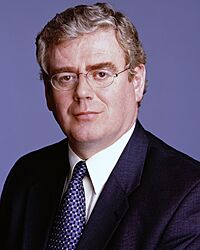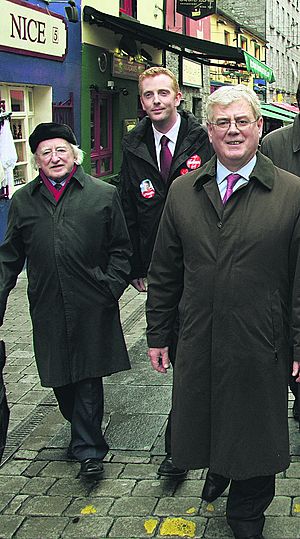Eamon Gilmore facts for kids
Quick facts for kids
Eamon Gilmore
|
|
|---|---|

Gilmore in 2014
|
|
| European Union Special Representative for Human Rights | |
| In office 1 March 2019 – 29 February 2024 |
|
| President | Jean-Claude Juncker Ursula von der Leyen |
| Preceded by | Stavros Lambrinidis |
| Succeeded by | Olof Skoog |
| European Union Special Representative for the Colombian Peace Process | |
| In office 1 October 2015 – 19 February 2019 |
|
| President | Jean-Claude Juncker |
| Preceded by | Office established |
| Succeeded by | Office abolished |
| Tánaiste | |
| In office 9 March 2011 – 4 July 2014 |
|
| Taoiseach | Enda Kenny |
| Preceded by | Mary Coughlan |
| Succeeded by | Joan Burton |
| Minister for Foreign Affairs and Trade | |
| In office 9 March 2011 – 11 July 2014 |
|
| Taoiseach | Enda Kenny |
| Preceded by | Brian Cowen (Foreign Affairs) Mary Hanafin (Trade) |
| Succeeded by | Charles Flanagan |
| Leader of the Labour Party | |
| In office 6 September 2007 – 4 July 2014 |
|
| Deputy | Joan Burton |
| Preceded by | Pat Rabbitte |
| Succeeded by | Joan Burton |
| Chair of the Organization for Security and Co-operation in Europe | |
| In office 1 January 2012 – 18 December 2013 |
|
| Secretary-General | Lamberto Zannier |
| Preceded by | Audronius Ažubalis |
| Succeeded by | Leonid Kozhara |
| Minister of State | |
| 1994–1997 | Marine |
| Teachta Dála | |
| In office June 1989 – February 2016 |
|
| Constituency | Dún Laoghaire |
| Personal details | |
| Born | 24 April 1955 Caltra, County Galway, Ireland |
| Political party | Labour Party (1999–present) |
| Other political affiliations |
|
| Spouse |
Carol Hanney
(m. 1981) |
| Children | 3 |
| Education | Garbally College |
| Alma mater | University College Galway |
Eamon Gilmore (born 24 April 1955) is an Irish diplomat and former politician for the Labour Party. He has held many important roles in both Irish and European politics. For example, he was the EU Special Representative for Human Rights from 2019 to 2024.
Before that, he was the Tánaiste (Deputy Prime Minister of Ireland) and Minister for Foreign Affairs and Trade from 2011 to 2014. He was also the Leader of the Labour Party from 2007 to 2014. For many years, he was a Teachta Dála (TD), which is a member of the Irish parliament, for the Dún Laoghaire area.
In the 2011 general election, he led the Labour Party to its best result ever, winning 37 seats. The party then formed a government with the Fine Gael party.
Contents
Early Life and Education
Eamon Gilmore was born in Caltra, County Galway, in 1955. He grew up on a small farm. His father died when he was very young, so his mother raised him and his brother while running the farm.
He went to a small primary school where lessons were taught in the Irish, and he still speaks it fluently. He won a scholarship that allowed him to attend Garbally College in Ballinasloe.
Later, he studied psychology at University College Galway (UCG). In college, he was active in the drama society and debating. He was also elected President of the Students' Union. After college, he became the President of the Union of Students in Ireland (USI), representing students all over the country.
Before starting his political career, Gilmore worked as a trade union organiser. He helped workers in hotels, catering, and other industries, fighting for their rights and better working conditions.
Political Career
Gilmore's political journey began in local government. In 1985, he was elected to serve on councils in the Dún Laoghaire–Rathdown area.
In 1989, he was elected to the Dáil Éireann (the Irish parliament) for the first time as a member of the Workers' Party. He would be re-elected in every election until he retired from Irish politics in 2016.
A New Political Party
In 1992, Gilmore and several other politicians, including Proinsias De Rossa, left the Workers' Party. They wanted to create a new party with a different approach. They formed a new party called Democratic Left.
Gilmore has always worked for peace in Northern Ireland. In 1989, he helped organise the Peace Train campaign. This was a protest against the bombing of the railway line between Dublin and Belfast.
From 1994 to 1997, he served as a junior minister in the government, where he was in charge of marine issues. He brought in major reforms for ports and banned nuclear vessels from Irish seas. In 1999, he played a key role in merging his party, Democratic Left, with the Labour Party.
Leader of the Labour Party

In 2007, Eamon Gilmore became the leader of the Labour Party. He wanted to make Labour a top choice for voters. Under his leadership, the party did very well in the 2009 local and European elections, gaining many new council seats and three seats in the European Parliament.
In the 2011 general election, Gilmore led the Labour Party to its best result in history, winning 37 seats in the Dáil. This was a huge success for the party.
Working for Equal Rights
Gilmore played a big part in modernising Ireland's laws. He was a strong supporter of marriage equality, calling it "the civil rights issue of this generation." He promised that his party would hold a vote on the issue. This led to the referendum on marriage equality in 2015, which was successful.
Serving in Government
After the 2011 election, the Labour Party joined with Fine Gael to form a new government. Gilmore became the Tánaiste (Deputy Prime Minister) and the Minister for Foreign Affairs and Trade.
Important International Roles
As Minister for Foreign Affairs, Gilmore represented Ireland on the world stage. In 2012, he was the Chairperson of the Organization for Security and Co-operation in Europe (OSCE), an organisation that works to keep peace and stability in Europe.
In the first half of 2013, Ireland held the Presidency of the Council of the European Union. Gilmore led this effort, chairing important meetings and helping to agree on a huge seven-year budget for the entire EU.
He also worked to expand Ireland's network of embassies around the world. In 2014, he announced the opening of eight new diplomatic offices in Europe, Asia, Africa, and the Americas to help with trade and investment.
Leaving the Bailout
During his time in government, Ireland was in a difficult economic situation and had received a bailout from the EU and the IMF. Gilmore was part of the team that managed the country's finances. On 15 December 2013, Ireland successfully exited the bailout program, becoming the first country in the eurozone to do so.
In May 2014, after the Labour Party had a poor result in local and European elections, Gilmore resigned as leader. He was succeeded by Joan Burton.
Life After Irish Politics
Gilmore announced in 2015 that he would not run in the next general election. After retiring from the Dáil in 2016, he became a professor at Dublin City University and has lectured at universities all over the world.
Working for the European Union
In October 2015, Gilmore was appointed as the EU Special Envoy for the Peace Process in Colombia. He helped support the efforts to end the long-running conflict in that country.
Then, in February 2019, he was appointed as the EU Special Representative for Human Rights. In this role, he worked to promote and protect human rights across the globe on behalf of the European Union. His term ended in February 2024.
Awards and Personal Life
Gilmore has received many honours for his work. In 2015, Foreign Policy magazine named him one of its 100 leading Global Thinkers for his role in Ireland's marriage equality referendum. The government of France made him an Officer of the Legion of Honour, and Colombia awarded him the Order of San Carlos for his work on the peace process.
He is married to Carol Hanney, whom he met at university. They have three children and live in Shankill, Dublin.
 | Selma Burke |
 | Pauline Powell Burns |
 | Frederick J. Brown |
 | Robert Blackburn |



